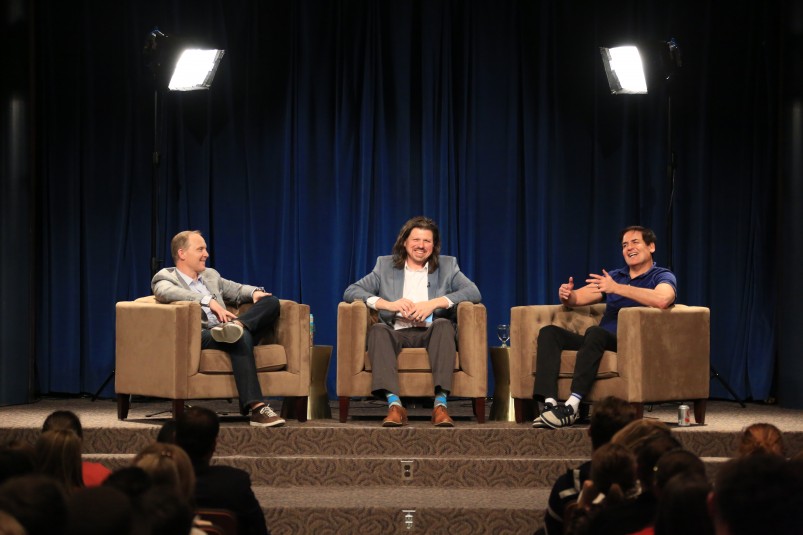Mark Cuban, Fox Sports’ Eric Shanks Ponder Digital Future of Sports Production
Execs discuss digital content and the evolution of TV today, offer advice to students at Indiana University
Story Highlights
Last week, FOX Sports and its education initiative FOX Sports U, in partnership with Indiana’s Media School, offered a one-of-a-kind discussion to students and faculty at Indiana University, featuring famous entrepreneur and Dallas Mavericks owner Mark Cuban and Fox Sports President/COO/Executive Producer Eric Shanks.

From left: Fox Sports’ Eric Shanks, Indiana University’s Dr. Galen Clavio, and Mark Cuban speak before a packed hall at IU’s Whittenberger Auditorium on Feb. 18.
The tandem — both alums of the university — discussed various topics facing the future of the sports-video, technology, and entertainment business, including the growing impact of digital.
Digital Is Experience
Both spoke passionately about the prospects of digital content in sports and how consumer habits, specifically in mobile, are dramatically changing the way networks, leagues, and teams need to reach their fans.
“Digital bits don’t care how they’re transferred, how they’re carried, where they’re distributed, how they’re broadcast, where they’re consumed, or on what device,” says Cuban, who donated $5 million to the university to establish the Mark Cuban Center for Sports Media and Technology last year. “It’s about creating the best experience to consume those bits.”
Those experiences are increasingly about personal interaction and less of a one-size-fits-all distribution method that content producers and distributors have been accustomed to for so long. It’s an environment that can be overwhelming but, for Shanks, is an exciting proposition.
“We’re really in the third business era of television,” says Shanks. “In the ’50s, ’60s, and ’70s, it was broadcast television — and it was the heyday. In the ’80s, ’90s and ’00s, it was the explosion and then the maturation of pay television [that’s when we all got cable bills and satellite bills and telco bills], and now we are coming into the generation that it’s not broadcast, it’s one-to-one. All our experiences are going to be one-to-one and IP-driven. That’s a huge opportunity.”
Education Connection
Trends in the industry were certainly top of conversation, but students also received some valuable career advice from the two sports-industry titans, including emphasizing that education goes way beyond the four walls of college.
“When we’re in school, a lot of our learning is learning about what’s already happened and learning how to do something that someone has already done,” said Shanks. “And that will get you … that might get you a job, if you can impress upon the right employer that you have a good work ethic, that you have the right personality that they want, that they value. But, literally, from that point on, your job is to look forward.”
Cuban concurred: “I think one of the biggest mistakes people make after they graduate is, ‘Okay, I’m ready, world. Here I come.” When I sit and interview, they’re not demonstrating that they are continuing to learn. Go out and add to your résumé, building a feature set for yourself as a free agent that you can use going forward. That’s a big step forward. I always try to push kids to get paid to learn and get paid to find things they can add to their résumé or really give them a foundation into new areas.”
The panel is one of the latest contributions that Fox Sports is making in its relationship with Indiana University and is a key development from an education initiative driven by the Fox Sports U program, which is designed to bring real-world projects into the classroom.
“The goal for all of us is to further bridge the gap between academia and the sports industry,” says Kaitlyn Beale, senior manager, strategic partnerships, Fox Sports. “We’re trying to continue to come up with new ways to do that and provide these types of experiences so that students are geared for success as soon as they graduate.”
